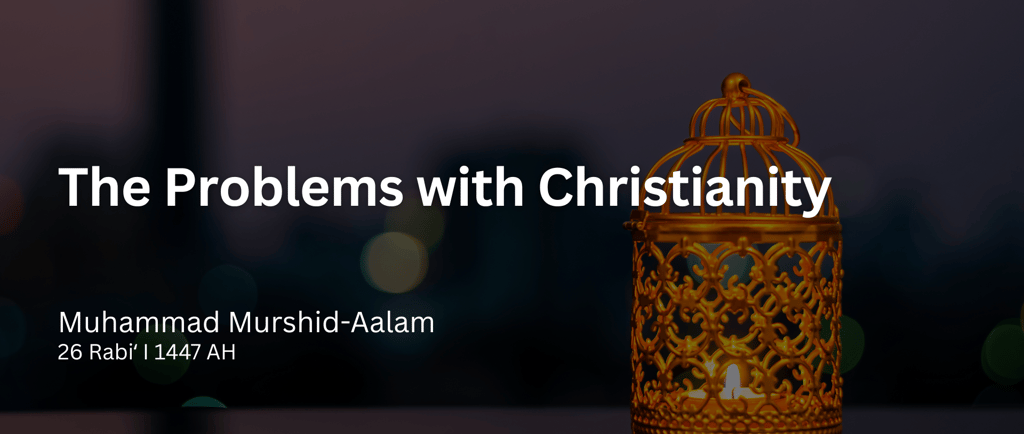
The Problem With Christianity
Muhammad Murshid-Aalam
26 Rabiʻ I 1447 AH
The Problems with Christianity
This article will be exploring the common arguments made for Christianity and providing Islamic refutations
ARTICLES


The Problems with Christianity
Christianity is one of the largest religions in the world, and many Christians sincerely believe they are following the truth. However, when we examine its core beliefs in light of reason, revelation, and the preserved message of Islam, we find that Christianity rests on ideas that contradict both rational thinking and divine truth. By exploring the common arguments made for Christianity and providing Islamic refutations, we can see why Islam is the only pure, uncorrupted path to the one true God.
1. The Problem of the Trinity
Christian claim: God exists as “three in one”, the Father, the Son, and the Holy Spirit. They argue that this is a divine mystery beyond human comprehension, but nevertheless the essence of faith.
Islamic refutation:
The concept of the Trinity is a clear contradiction. Either God is One, or He is three. To claim both simultaneously is to affirm an impossibility as it is putting limitations on the being of God. The Qur’an directly challenges this belief:
“They have certainly disbelieved who say, ‘Allah is the third of three.’ But there is no god except one God.” (Surah al-Ma’idah 5:73)
Islam teaches pure monotheism, tawheed, affirming God’s Oneness without partners, equals, or divisions. Unlike the Trinity, this belief is both rationally coherent and divinely revealed.
Furthermore, in the Holy Qura’n, Allah (swt) refers to Jesus being questioned about the beliefs of the Christians:
“And [beware the Day] when Allāh will say, "O Jesus, Son of Mary, did you say to the people, 'Take me and my mother as deities besides Allāh?'" He will say, "Exalted are You! It was not for me to say that to which I have no right. If I had said it, You would have known it. You know what is within myself, and I do not know what is within Yourself. Indeed, it is You who is Knower of the unseen.” (Surah al-Ma’idah 5:116)
2. The Problem of Jesus (as) as God
Christian claim: Jesus (as) is divine, the “Son of God,” and part of the Godhead. They argue that his miracles, virgin birth, and resurrection prove his divinity.
Islamic refutation:
Miracles do not prove divinity. Prophets such as Moses split the sea, and Muhammad ﷺ split the moon, yet no one claimed they were gods. The virgin birth itself is no argument for divinity, as Adam was created without a father or mother.
Jesus (as) himself affirmed his humanity:
“But of that day and hour knoweth no man, no, not the angels of heaven, but my Father only.” (Matthew 24:36)
If Jesus (as) were God, how could he be ignorant of the Last Day? Islam restores Jesus (as) to his rightful position, a noble Prophet of Allah (swt), born miraculously, who called people to worship the one true God.
3. The Problem of Original Sin and Atonement
Christian claim: Humanity is born sinful due to Adam’s disobedience. Jesus (as) died on the cross to pay for the sins of mankind, granting salvation to all who believe in him.
Islamic refutation:
This belief portrays God as unjust. Why should all of humanity inherit the sin of one man? Why would an innocent prophet need to be crucified for the sins of others? The Qur’an rejects this idea:
“And nobody does anything but to his own account, and no bearer of burden shall bear the burden of another. Then to your Lord is your return. Then He will let you know what you were disputing about.” (Surah al-An‘am 6:164)
In Islam, every soul is accountable for its own deeds. Forgiveness comes not through blood sacrifice but through sincere repentance and God’s mercy. This presents a far more just, merciful, and rational understanding of salvation.
4. The Problem of Scripture Corruption
Christian claim: The Bible is the Word of God and the ultimate source of guidance.
Islamic refutation:
Even Christian scholars admit that the Bible has undergone centuries of editing, translation, and alteration. There is no single original manuscript of the Bible today. Different denominations even disagree on which books belong in it. The Qur’an, however, is preserved word-for-word since its revelation, memorised by millions, and free of contradiction. Allah (swt) Himself takes the responsibility of the Holy Qur’an’s preservation:
“Indeed, it is We who sent down the Reminder, and indeed, We will be its guardian.” (Surah al-Hijr 15:9)
Therefore, Islam offers certainty where Christianity offers doubt.
5. The Problem of Blind Faith
Christian claim: Faith requires belief in things beyond reason, and salvation comes through unquestioning trust in Jesus (as) as Lord.
Islamic refutation:
Sound true belief cannot be based on blind faith, rather a set of beliefs that is decisive and shapes your viewpoint on life, and ensures your behaviour adheres to it. Islam appeals to both the heart and the mind. The Qur’an constantly invites people to reflect, think, and reason. Islam does not demand belief in contradictions, but rather calls to truths that fit both revelation and rational thinking. This is why many Christians who study Islam sincerely end up embracing it.
6. Muhammad ﷺ: The Final Messenger
Islam is not just a critique of Christianity, it is the continuation and completion of divine revelation. Central to this truth is the Prophet Muhammad ﷺ, the seal of the prophets, whose message was prophesied and whose mission is historically authenticated.
Prophesied in Previous Scriptures
Even within the corrupted Bible, remnants of prophecies about Muhammad ﷺ remain:
In Deuteronomy 18:18, God tells Moses: “I will raise up for them a prophet like you from among their brethren, and I will put my words in his mouth, and he shall speak to them all that I command him.” Muslims recognise this refers not to Jesus (as) (who was unlike Moses in key aspects), but to Muhammad ﷺ – who, like Moses, brought a comprehensive law and led a community as both prophet and statesman.
In John 16:7, Jesus (as) speaks of the Paraclete (the Comforter) who will come after him. Early Christians debated who this figure was, but Muslims affirm it refers to the Prophet Muhammad ﷺ, the one who clarified and completed God’s message after Jesus (as).
Authentication of His Prophethood
Unlike the myths surrounding the divinity of Jesus (as), the life of Muhammad ﷺ is fully documented in history. His character, truthfulness, and impact are undeniable even to non-Muslim historians. Among the proofs of his prophethood are:
The Qur’an itself, unmatched in eloquence, preserved in perfection, and filled with knowledge far beyond the capacity of an unlettered man in 7th-century Arabia.
His unblemished character, known by his people as al-Amin (the trustworthy), even before revelation.
Fulfilled prophecies, such as the spread of Islam across vast lands, the preservation of the Qur’an, and signs of the Last Day unfolding as he foretold.
Therefore, belief in Muhammad ﷺ is not a blind leap of faith, but a conclusion supported by scripture, reason, and history.
Islam’s Superiority
When Christianity is stripped of its contradictions and innovations, what remains is what Islam already affirms, worship of the One God, belief in His prophets including Jesus(as) , and preparation for the Hereafter. Islam is not a rejection of Jesus (as), but the completion of his and all of the prophets’ true message.
Islam is superior because it offers:
Pure monotheism (Tawheed) without confusion.
A just and merciful system of salvation based on personal responsibility.
A perfectly preserved scripture free from human corruption.
A rational and spiritual balance that satisfies both intellect and soul.
A final messenger, Muhammad ﷺ, whose life and teachings complete and clarify all previous revelations.
A Call to Reflection
For Christians and all seekers of truth, does it make sense to believe in three gods in one? Does it make sense to believe God died on a cross? Does it make sense that an eternal book of guidance would be lost, altered, and disputed? Or is it more fitting that God preserved His final message in the Qur’an, calling humanity to worship Him alone?
Islam is not a new religion but the pure way of life revealed to all prophets, from Adam (as) to Muhammad ﷺ. It is the straight path, free from contradictions, preserved until the end of time.
“This day I have perfected for you your religion and completed My favor upon you and have approved for you Islam as your way of life.” (Surah al-Ma’idah 5:3)
The choice is before every soul, cling to man-made doctrines or submit to the eternal truth of Islam.
Socials:
https://www.youtube.com/@DeenMachine
https://www.instagram.com/deenmachine1924/
https://www.tiktok.com/@deenmach1ne
Author's Socials:
https://www.instagram.com/muhammadmurshidaalam/


